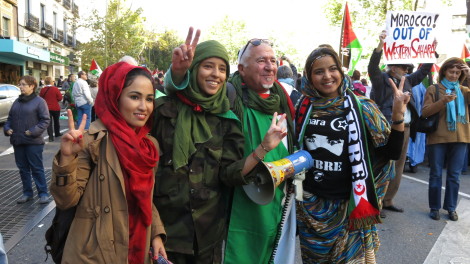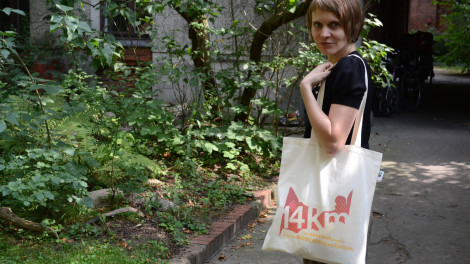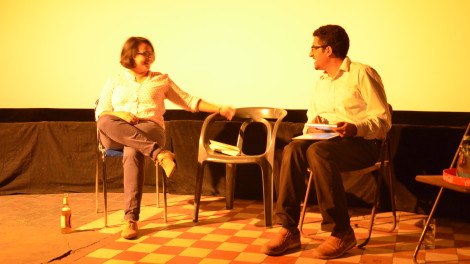Author Archives: Andreas Fricke
14km at Africa Day in Berlin: 17th of October 2015
14km e.V. presents itself at the open Africa Days. We invite you to visit us on Saturday, October 17th 2015, at the Sprengelhaus in Berlin Wedding. At the same location and all around Berlin other associations, initiatives, institutions and companies with focus on Africa can be visited. The entrance is free. The events will take place in German language. During the complete period of time we invite you to get to know the volunteer 14km team in a personal conversation - we speak English as well. Press release (German): Afrika-Tage der Offenen Tür 2015 Programme overview (German) Homepage Africa Days (German) The 14km programme on SAT, 10/17/15: 2:00 p.m. Presentation of 14km e.V. 2:30 p.m. Reading "Im Taxi" (Khalid Al-Chamissi) 3:30 p.m. Presentation International Volunteer Programme 5:00 p.m. Presentation 14km Film- and Discussion Series (incl. short movie screening)
“The Reality is Worse” – Film screening of “Darfur’s Skeleton”
The four guest discussing with moderator Carolin Bannorth: from left to right: Carolin Bannorth, Hervé Tcheumeleu, Sarah Reinke, Ahmad Hassan Arnau, Abbas Tharwat The Darfur conflict – told by local people, based on their own lived experiences. This was the theme of the fourth evening in 14km’s Film and Discussion Series, which featured Sudanese director, Hisham Hajj Omar’s documentary: “Darfur’s Skeleton”. From the outset, the audience was closely listening to the realities of Darfur as our guest, Ahmad Hassan Arnaud, himself having fled from the region, explained: “In Darfur, a village is burned every one to two days. But the media do not report it.” This 2009 film covers three dimensions of the war in Darfur: environmental destruction, persecution of the civilian population, and the role of tribal authorities in resolving the conflict. At the time of filming, three trees a day were being cut down in Kondowa forest – a rate that could soon lead to desertification of the region. In 2009, the forest is as good as dead. Nearby, in Otash camp, the home for tens of thousands of people displaced from their homes, inhabitants struggle to survive through daily life with close to nothing. For these refugees, selling the rare forest wood represents a scarce livelihood opportunity they are obliged to take, despite the protests of forest rangers in the film. “We have no choice”, the displaced declare. The Kondowa forest symbolizes a vicious cycle, which fuels the war in Darfur: a poor climate and limited arable land drives resource conflicts between neighbouring tribes, and nomadic and sedentary populations. In turn, hostilities destroy villages and force people to flee, leading to further exploitation of national resources in areas where thousands of refugees gather – as in the Kondowa Forest. Giving voice to the victims The sight of countless victims fleeing violence, which pervades the news and media, offers only an abstract context and encrypted figures. This documentary, in contrast, highlights the names, faces and voices of the victims. Aysha, for example, was shot and robbed in an attack in Guz. She lay alone and helpless in the village with her daughter until relatives were eventually able to rescue her, only for her injured leg to be amputated in Otash refugee camp, condemning her to a life of idleness. Half-smiling, Aysha laments: “How are we going to find the strength to cry?” By contrast, teacher Mohamed Adam, remains positive. He himself had to flee from home, traveling a dangerous route before reaching Otash camp. Having endured the experience, he is determined to pass on his knowledge to the children in the camp, so that they may tread a new, better path. In addition to allowing victims of the war to have their say, the film analyses the causes of the war, portraying the situation from their perspective. They speak of the responsibility of the central government in Khartoum, whose strategy of “divide and rule” and tactics using the Janjaweed militia has activated conflict lines and fuelled hostility between the Arab and African populations. Tribal leaders argue that with peace between the government and the rebels, conflicts between individual tribes would soon be reconciled. Yet, the government is hesitant to provide essential funding to tribes so that they might self-govern and achieve peace. Another obstacle to peace, particularly emphasised by political analysts, is the challenge of putting to trial war criminals and providing reparations to the victims – without which there can be neither peace nor an end to cycle of hatred. Holding the perpetrators accountable 14km staff Carolin Bannorth and Andreas Fricke The absence of judicial process was addressed by Sarah Reinke of the Society for Threatened Peoples in an audience discussion following the film screening. Tribunals at the local level and permanent mechanisms for prosecution are needed. At the international level, prosecution was not successful either. The International Criminal Court failed to hold President Omar al-Bashir accountable although he was indicted for his involvement in genocide, crimes against humanity, and war crimes. Ultimately, the international community’s attempts to resolve the conflict have not been helpful. According to Sarah Reinke, the Doha peace process was not supported by international powers, with Russia and China blocking the UN Security Council’s ability to act. Hervé Tcheumeleu, executive director of the Africa Media Centre, pointed to the economic interests of large defence manufacturing companies, and to countries including Russia, China and the UK. Similarly, the impotence of the African Union (AU) on the issue has been evident, with Tcheumeleu arguing that “many presidents in the AU support Al-Bashir, as they themselves are in the same position as he is.” “A village is burned every one or two days” Hajooj Kuka by Toyin Ajao (CC) Ahmad Hassan Arnaud, a young Sudanese man from Darfur who has been living in Berlin for three years, lived through the war himself. “The reality is still clearly worse than shown in the film,” he informed the audience. “A village is burned every one or two days. But the media do not report it.” Sarah Reinke agreed: “After twelve years of genocide, the situation is very grim.” It was difficult to take a positive outlook away from the discussion. But at least the film ended on an optimistic note with a hopeful phrase: Darfur has a strong skeleton – and so long as the skeleton remains intact, flesh will once again cling to it. The director, who is currently working under the name of Hajooj Kuka, is receiving a lot of accolades and prizes, from Toronto to Luxor, for his second documentary “The Beats of Antonov.” This film, which explores the music scene of his home country, gives expression to something that is obscured by the palpable suffering in “Darfur’s Skeleton”: Against an identity that is imposed by the Government and which drives conflict, the only solution is to enthusiastically become aware of one’s own cultural identity. After the first film, we know that Darfur’s skeleton is not yet broken. After the second film, we will know that music can bring Darfur’s skeleton back to life. We thank our guests Ahmad Hassan Arnaud, Sarah Reinke, Hervé Tcheumeleu and Abbas Tharwat for helping us approach the difficult topic by sharing their personal point of views. Film links: Film homepage Director’s CV Event organisation and moderation: Carolin Bannorth Coordination of the Film and Discussion Series: Andreas Fricke Text: Susanne Kappe Translation: Alex Odlum Photos: Silvia Limiñana, Caroline Bunge Organisation: The volunteer 14km Film Team The 14km Film and Discussion Series 2015 gets sponsorship by budgetary funds of the Federal State of Berlin – Office for Development Cooperation. Further events are scheduled as followed: 07 October / 28 October / 18 November / 9 December The events are dedicatet to a single country or specific topic, in order to give an artistic-documentary impression . The ensuing audience discussion aims to include further informations by an affected person living in Berlin and by an scientific expert, always aiming to make links to North-South relationships. We express thanks for the support:
Western Sahara
14km Film- and Discussion Series
“LIFE IS WAITING – Referendum and Resistance in Western Sahara” (documentary, USA /Western Sahara 2015, original version with English subtitles, 59 min) by Iara Lee on Wednesday, 07th October 2015 at 6:45 p.m. (1845) at Filmrauschpalast, Lehrter Straße 35, 10557 Berlin-Moabit 14km.org presents the fifth evening screening of the 2015 “14km Film and Discussion Series.”: In her film, “LIFE IS WAITING – Referendum and Resistance in Western Sahara” (Arabic/Spanish/English/French with English subtitles), director Iara Lee documents how the Sahrawis, the local people of Africa’s last colony, Western Sahara, continue to struggle for their independence from Morocco despite it being promised by the former colonial power, Spain, over 40 years ago. Following the film screening, special guests will engage with the audience to discuss the independence movement and the current situation in Western Sahara. Attendance is free, donations are welcome. The event takes place at Filmrauschpalast cinema, on the 1st floor of the Kulturfabrik's backyard building in Berlin Moabit: Lehrter Straße 35, 10557 Berlin. The discussion ends at 22:00 (10 pm) at the latest. Facebook event Additional film informations The 14km Film and Discussion Series 2015 gets sponsorship by budgetary funds of the Federal State of Berlin – Office for Development Cooperation. Further events are scheduled as followed: 28 October / 18 November / 9 December The events are dedicatet to a single country or specific topic, in order to give an artistic-documentary impression . The ensuing audience discussion aims to include further informations by an affected person living in Berlin and by an scientific expert, always aiming to make links to North-South relationships. We express thanks for the support:
+++Now available: Specially designed 14km Jute bags!+++
Jute bags labelled with our motto "14km - The shortest distance between North Africa and Europe" are now available! We want to spread the message of just how close North Africa and Europe are to each other! It's a message that deserves more attention, especially now when so many people are fleeing the region and seeking refuge in Europe. We want to send a signal against xenophobia and to promote the building of bridges across these "14km." These fair-trade, hand-made jute bags are produced especially for you! You can purchase one (or more!) for 10 EUR* per bag at our next event, such as the 14km Film and Discussion Series. Alternatively, we can deliver if you pay the extra shipping costs - simply email info@14km.org to place and order. Buy a bag and wear a statement of just how close our cultures are! * By purchasing a 14km jute bag, you help support our non-profit, volunteer work.
The Difficulties of Doing Justice to Yemen in a Documentary
Film Screening: "Expedition Yemen - 126 Degrees in the Shade"
Two Swedes, a camel and the wide Yemeni desert – all set for an adventure. The third evening of our 14km Film and Discussion Series brought opposites together, not only on the screen, but also off it in the Filmrauschpalast filled to capacity with a diverse group of guests. After the film, Amal Nasser, Yemeni activist and co-founder of ArabHub Berlin, and Mohamed al-Thawr of "The Youth Initiative for a New Yemen", discussed stereotypes and diversity, as well as women's rights in contemporary Yemen. The film's Swedish director, Mikael Strandberg, is a passionate and experienced explorer. According to a friend speaking on his behalf, Strandberg's message to the audience was: "It's very hard to be in Yemen and not to fall in love with the country". However, whether his film succeeds in conveying this same message while portraying the diversity of the country and its people's needs, brought up a range of opinions in the ensuing discussion. An Adventurous Perspective The film is shot from the perspective of an adventurer looking directly into the director’s camera. Right from the introduction, the audience is prepared for an expedition, which they watch unravel over 60 minutes from the comfort of their armchairs. We first find the two exhausted explorers in the middle of the desert, seemingly stranded with their camel unwilling to continue. There seems to be no way forward. We are then transported back to the starting point of the journey in the capital, Sanaa. There, Mikael Strandberg and the journalist Tanya Holm are eagerly getting to know Yemeni society, meeting a Sheikh responsible for negotiations over a murder case. Strandberg is impressed by the good atmosphere among the hundreds of tribal members and their ability to resolve such a sensitive dispute, with neither aggression nor the assistance of the state institutions. He is less impressed, however, by the ever-present weapons and dangers of possible terrorist attacks. After that episode, we accompany Mikael and Tanya on their gruelling trek through the desert of the al-Mahra region, witnessing the generous hospitality with which the humble local villagers consistently greet them. The adventurers travel by foot in order to get as close as possible to the locals and to try and reciprocate their warmth and curiosity. By contrast, negative images of terrorists and rebel fighters with their attacks, kidnappings and hate speech, hardly appear in the film – they were simply not encountered during the 2012 journey. And that is a key message of the director: in contrast to the negative coverage of Yemen in the Western media, it is important to paint a positive picture that emphasises the normality of people above and beyond the country’s troubles with violence. Diversity versus Stereotypes Amal Nasser, invited to the post-film discussion as an expert on Yemen, was left unconvinced by Mikael Strindberg's portrait of Yemen. She points to the early scene portraying the gathering of armed men, or to that set in a Bedouin tent where Strandberg explains to his hosts the workings of a GPS device, as examples of the unbearable stereotypes of Yemenis reproduced even in this film. According to Amal, the film does not show the reality of 9-to-5 professionals or cafe visits among friends in the way they would be captured by local Yemeni directors. Mohamed al-Thawr, however, disagreed. For him, it is clear that the adventurer is looking for exciting snapshots, as he would expect to find them on a dangerous wilderness journey. Of course, there is another daily life in Yemen, but it is not so interesting to document. Exploring Yemen's diversity has been somewhat of a personal expedition for Mohamed al-Thawr, who has spent his whole life oscillating between Yemen and Germany. 25 per cent of Yemen's population in the 1960s were Yemeni Jews. To meet a few of those who are still living in Yemen, Mohamed made a contact through his father's hospital, travelled to the Jewish villages and invited the Yemeni Jews to a meeting in Sanaa. "After the masks have been lifted, you can see thousands of similarities ," remarked Mohamed al-Thawr on the impressive experience. Women in Yemen: Emancipated or without Rights? For Amal Nasser, the lived diversity of a society is closely related to the ability of women to move naturally in public space. Unfortunately, this, along with the representation of women in political office, is rare. Although there are female Yemeni politicians, many are entangled in a corrupt system and do not pursue political programmes on their own. This is in contrast to committed young activists pursuing social goals outside of the political system. The role of women in society represented a controversial topic during the demonstrations of 2011. Dr. Yahya al-Thawr, Mohamed's father, is convinced that Yemeni women are in fact "very emancipated" as demonstrated by their important role in the demonstrations along with the award of the Nobel Peace Prize to the female Yemeni activist and politician: Tawakkol Karman. Amal Nasser, by contrast, argued that Yemeni women protested as individuals, rather than on behalf of females. For her, it is unfortunately clear that most women in Yemen are oppressed, by fathers, brothers and other authority figures who constrain their free choices. As such, their primary struggle is to achieve their own rights as women, with other revolutionary goals a secondary interest. A Yemeni man in the audience agreed: "It is us men who say that women are supposedly equal in Yemen ". Yemen Today Today's violent situation in Yemen has extinguished the hopeful mood that permeated the country in 2011 after the overthrow of Ali Abdullah Saleh. "The war is a disaster," summarised Mohamed al-Thawr. But this declaration of love, as director Mikael Strandberg describes his film about Yemen, represents at least a small positive beacon amidst a sea of terrible events. Thanks to Amal Nasser and Mohamed al-Thawr for contributing to the fascinating discussion and for providing their interesting insights into the social and political situation in Yemen. Movie links: Film homepage Distribution Information Director’s comment Event Presentation and Moderation: Hussein Ben Amor On site coordination: Andreas Fricke Text: Susanne Kappe Translation: Alex Odlum Photos: Jana Vietze Programme: the 14km Volunteer Film Team The 14km Film and Discussion Series 2015 gets sponsorship by budgetary funds of the Federal State of Berlin – Office for Development Cooperation. The 14km Film Database offers an additional collection of films from and about Yemen, including shorts, documentaries and feature movies. The media collective "# Support Yemen" is producing videos like the short film "The Melody of our Alienation". You find a tv documentary made by interviews of yemeni women on the revolution. The upcoming Film and Discussion Event takes place on September 16th and will be about Sudan. Read more about the date and the film screening of "Darfur's Sceleton". Further events are scheduled as followed: 07 October / 28 October / 18 November / 9 December The events are dedicatet to a single country or specific topic, in order to give an artistic-documentary impression . The ensuing audience discussion aims to include further informations by an affected person living in Berlin and by an scientific expert, always aiming to make links to North-South relationships. We express thanks for the support:





